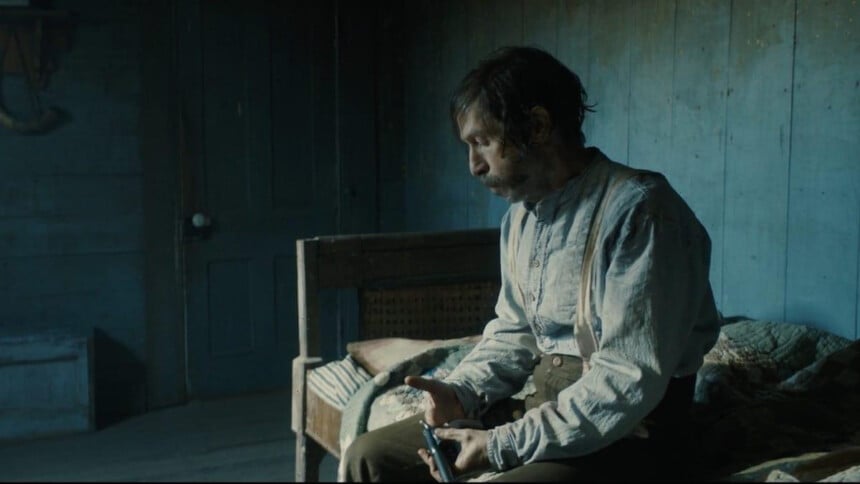OLD HENRY (2021)
Written and Directed by Potsy Ponciroli ◆ Produced by Michael Hagerty and Shannon Houchins ◆ Distributed by Shout! Studios
The weight of the past so often looms large in the Western film genre. In classic films like The Gunfighter (1950), High Noon (1952), Ride the High Country (1962), or Unforgiven (1992), the plots are often informed by events we are never shown—the heaviness of old disputes, transgressions, resentments, lovers scorned, opportunities squandered, and the regret that accompanies it all. For many of the characters in these films, their past emerges as a formidable barrier to their prospects for future happiness.
Alongside regret, at least in the movies, always comes the hope for redemption—a chance to put things right and to move on. In the case of Old Henry, the hope lies with the next generation as a father tries to set his son on a better path than his own. The film features the robustly talented Tim Blake Nelson as the titular Henry. Nelson is a perennial character actor, often in comedic roles as a loveable rube (e.g. The Ballad of Buster Scruggs and O Brother, Where Art Thou?). In Old Henry he is given a well-deserved shot at a leading dramatic role.
The film is set on an Oklahoma territory homestead in 1906 where Henry, an aging farmer with a checkered and possibly violent past, works the land and raises pigs with his teenage son, Wyatt (Gavin Lewis). His wife is deceased, though her brother Al (Trace Adkins) lives nearby. Life is tedious and challenging, but they have managed to carve out a stable existence through the fruits of their labor. However, this peace is shattered one day when a riderless horse appears on the crest of the hill near their farmhouse. Soon after, a wounded fugitive, Curry (Scott Haze), is discovered, along with a satchel full of cash. Henry takes in Curry and it’s not long before trouble arrives at his door.
Old Henry is, at its core, a siege film, as Henry, the inexperienced Wyatt, and the wounded Curry are confined and surrounded in the farmhouse and must overcome overwhelming odds to survive.
In the classic Westerns by filmmakers like John Ford (Stagecoach, The Searchers) and Anthony Mann (Winchester ’73), the story lines often involve journeys into or through forbidding and hostile regions. Landscapes feature so prominently in these stories that they are almost characters, while providing a context for the trial that the protagonists must overcome. This is not the case in Old Henry, however, which sets it apart from traditional Westerns. It could almost be considered a “chamber Western” as the action takes place solely within the confines of one homestead, so much so that it could easily be adapted as a stage play.
This is not in itself a problem, but the lack of the environment-as-character motif places a greater burden on character development, dialogue, and well-plotted action to build narrative tension. Therein lies the rub: These three elements are not strengths of this film.
There is also a distracting unevenness to Old Henry’s casting. Nelson wholly inhabits his character. His performance is so distilled and committed that it raises the bar of authenticity to a point that is unachievable for the rest of the cast. Country singer Trace Adkins plays the brother-in-law, Al, with a strong, natural presence. But next to Nelson, he is a complete mismatch. Gavin Lewis as Wyatt unfortunately comes off less like an uneducated, early 20th-century Okie pig farmer’s son, and more like someone fresh off the set of a Disney Channel tween sitcom. The three actors seem like they are acting in three different films.
Still, there are redeeming qualities that make Old Henry a worthwhile watch—there’s not only the strong lead performance by Nelson, but the plot contains an entertaining twist.
The theme of shifting personal identities features prominently in the film and provides the plot with its twist. Henry, Curry, and the lead antagonist, Ketchum (Stephen Dorff), misdirect the other characters and the audience. The viewer has to work to determine who is really telling the truth about his identity and intentions. Thus the movie is not without some satisfying complexity. While it may be an imperfect film, it is certainly not a cookie-cutter work, and it embraces enduring themes of truth and deception, hope and regret, and father-and-son bonds.
Since we all must face the repercussions of past decisions, Henry’s story has universal resonance. As Marcel Proust said in Remembrance of Things Past:
There is no man … however wise, who has not at some period in his youth said things, or lived a life, the memory of which is so unpleasant to him that he would gladly expunge it. And yet he ought not entirely to regret it, because he cannot be certain that he has indeed become a wise man…
Image Credit:
above: Tim Blake Nelson in the 2021 film Old Henry (Shout! Studios and Hideout Pictures)

Leave a Reply